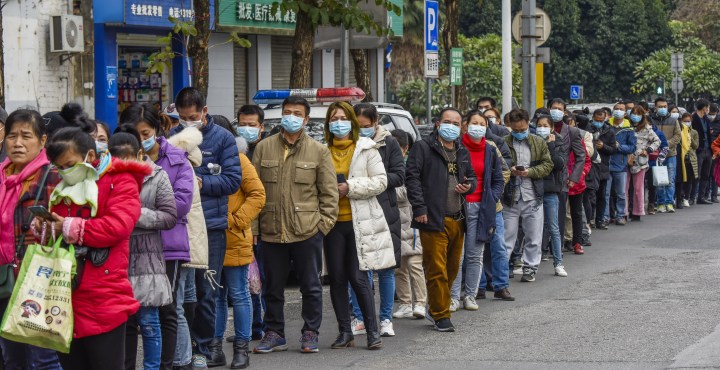Virus Watch
South Africans quarantined in Wuhan, the coronavirus epicentre

South Africans in Wuhan, China are having to take extreme measures to avoid contracting the coronavirus. Here at home, authorities have developed a monitoring and reaction plan to detect and react to any suspected infections.
Thirty-five South Africans are known to be in the city of Wuhan, China, the epicentre of the outbreak of the deadly coronavirus.
This is according to Health Minister Zweli Mkhize who told the media in a briefing at the National Institute for Communicable Diseases (NICD) offices on Wednesday 29 January that none of the South Africans was infected at this point.
Speaking on the country’s preparedness to detect, manage and contain any cases of coronavirus should it come to South Africa, Mkhize said citizens need not worry as measures have been put in place by the Department of Health, NICD and the World Health Organisation Africa (WHO).
Mkhize said the health department was working with the Department of Home Affairs and the Department of International Relations, both of which were in contact with the 35 South Africans currently in Wuhan.
He said authorities in China were monitoring the situation and that International Relations Minister Naledi Pandor was in contact with the South Africans in Wuhan.
“If there is any need to respond or do anything they will be in a position to do something,” Mkhize said. “The minister has indicated that they are in contact with people in Wuhan. We are monitoring that.”
Professor Cheryl Cohen from the NICD described coronaviruses as a family of viruses that are normally found in animals and humans. The virus causes illness ranging from the common cold to more severe diseases such as Middle East Respiratory Syndrome (MERS) and Severe Acute Respiratory Syndrome (SARS).
“Because of the origin of the virus, in this case, it is linked to the seafood and animal market in Wuhan,” Cohen said. “It is assumed that this virus is of zoonotic or of animal origin, although the exact source of the virus is not yet known.”
Roxanne Rawlins, a South African teacher who lives in Wahun, told Jacaranda FM that the city is in lockdown.
“When you leave your house you feel anxious. The city is currently on lockdown. Public transport is also stopped, so we can go nowhere. If we need food we must walk to the closest supermarket,” Rawlins told Mark Bester on the show.
“I am definitely afraid because also medical supplies are running low.”
Mkhize stated that people entering or leaving Wuhan are subjected to a 14-day quarantine to ensure they do not develop symptoms of the coronavirus.
While the US has suspended flights between major US hubs and Beijing, Shanghai, and Hong Kong between 1 and 8 February, CNBC reported, South Africa has no plans to do so yet.
“WHO does not recommend restrictions on travel and trade,” said Dr Brian Chirombo from the organisation.
The first cases of the virus were detected in early January 2020 in Wuhan and since then more than 4,000 cases have been reported and over 100 people have died. Cases have since been reported in the US, Canada, France, Germany, Japan, Thailand, Malaysia, Nepal and Sri Lanka.
Mkhize has confirmed that there was also a suspected case in Zambia.
“The NICD is working with a team in Zambia,” he said, “We will know if there are any updates with that case.”
Mkhize said temperature screenings at airports will be intensified, especially with flights coming in from China. But he also noted that people coming in through land borders will be monitored.
If a case of the virus is detected in South Africa, the department has designated three major hospitals – Charlotte Maxeke Academic, Steve Biko and Tembisa – as treatment facilities that are equipped to deal with patients with the virus.
Cohen said the National Health Laboratory Services was offering 24-hour laboratory services to detect the virus, should there be suspicion of contraction.
“We all need to work together to stay ahead of the epidemic,” WHO’s Chirombo said. DM


















 Become an Insider
Become an Insider